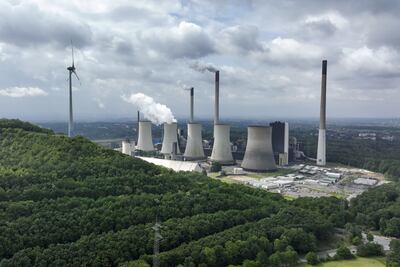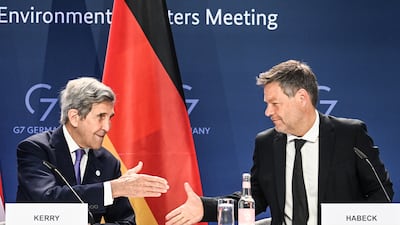The G7 countries on Friday promised to make their electricity grids mostly carbon-neutral by 2035 and cut funding for fossil fuels by the end of this year, toughening their climate commitments at a time of crisis in their domestic energy markets.
Current G7 chair Germany hailed what it said were “enormous steps forward” at a two-day meeting of the group’s climate and energy ministers, held in Berlin in the shadow of the war in Ukraine and a resulting surge in fuel prices.
An 84-point agreement said any fossil fuel subsidies to mitigate the fallout from Russia’s invasion should be “temporary and targeted” as countries try to stay on track with their climate change goals.
German Vice Chancellor Robert Habeck said it was more important than ever to speed up the shift away from fossil fuels at a time when Europe’s dependency on Russian oil and gas is complicating its response to the war.
“Protecting the climate, exiting coal and expanding renewable energies are questions of national, European and international energy security that we need to tackle resolutely together,” Mr Habeck said.
The G7 countries — Britain, Germany, France, Italy, the US, Canada and Japan — set a goal of having “predominantly decarbonised electricity sectors by 2035”, going further than a previous pledge to do this at some point in the 2030s.
They said they would do this by “rapidly scaling up the necessary technologies and policies for the clean energy transition”. Countries including Britain and Germany plan to massively increase offshore wind power generation.
Electricity is only one part of their energy consumption. The countries said they would also “drastically increase” the use of renewable fuels in heating, air conditioning and transport.
Mr Habeck has described the expansion of wind and solar power as geopolitically prudent to prevent countries such as Russia from monopolising energy. But the fuel squeeze has also stirred interest in using more fossil fuels.
The seven countries adopted tougher language on cutting methane emissions, saying reductions were necessary to keep alive the Paris Agreement target of limiting global warming to 1.5°C over pre-industrial levels.
And in what Germany hailed as a significant breakthrough, Japan for the first time promised to end all subsidies for overseas fossil fuel plants — joining the other six countries in pledging this by the end of 2022.
A communique after last year’s summit, when Britain held the G7 presidency, had only extended this promise to coal power, regarded as the most environmentally damaging fossil fuel.
This year’s talks ended with a separate declaration on protecting the oceans in which the seven nations said they were “ready to do our utmost” to tackle plastic pollution.
All seven countries have committed to reduce their net greenhouse gas emissions to zero by 2050. The talks come six months after the Cop26 summit in Glasgow brought about numerous pledges to drive down carbon emissions.
The Glasgow summit ended in acrimony after India pushed through an amendment to water down a global commitment to reduce coal power consumption.

“I’m going home with a good feeling after this G7 meeting,” said German Environment Minister Steffi Lemke, who said the club of rich democracies was responsible for dealing with the outsized environmental damage it has caused.
“Despite Russia’s terrible war against Ukraine, despite the pandemic and discussions about energy security, the community of nations is sending a clear signal of doing more to protect nature and the environment.”
Analysts at climate think tank E3G said the announcements were a step in the right direction but there was much still to do when German Chancellor Olaf Scholz hosts the G7 leaders for their annual summit next month.
Mr Scholz’s main proposal is to create a separate “climate club” of green-minded nations to drive through commitments that would struggle to find consensus in forums such as the UN and G20.
Brick Medak, the head of E3G’s Berlin office, said there were gaps in “the actions needed in this decade to phase out coal and mobilise the trillions necessary for a global green transition”.
“Olaf Scholz must show up at the leader’s level ready to go beyond his pet project climate club and move G7 leaders on where the climate and energy ministerial fell short,” he said.


